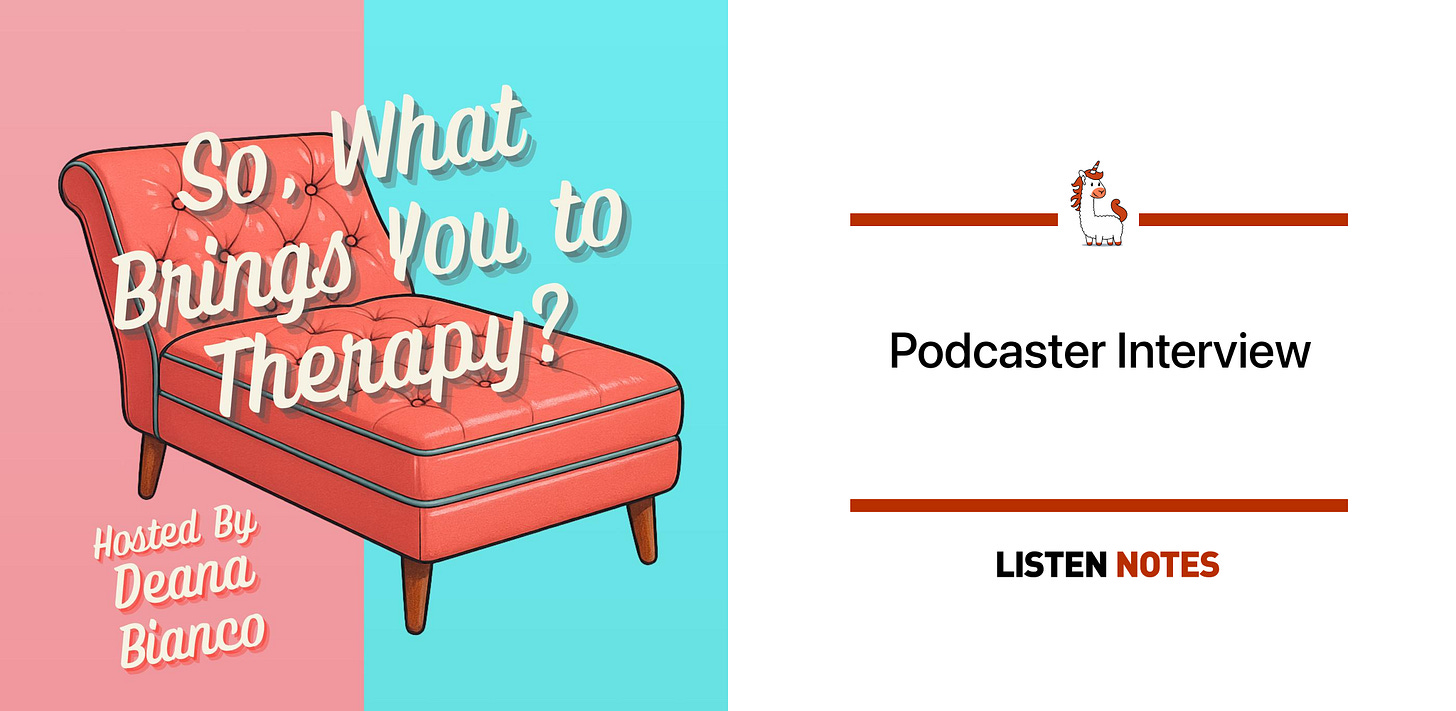Honest conversations about mental health, therapy, and personal growth with journalist-turned-therapist Deana Bianco.
"One thing I’ve learned on my podcasting journey is that you have to lean into the fear."
Today Deana Bianco, the creator of So, What Brings You to Therapy? shares her story of mental health podcast.
► Tell us about you and your podcast
I’m Deana Bianco, a licensed therapist with a background in journalism. I host “So, What Brings You to Therapy?”, a mental health podcast that blends honesty, humor, and curiosity. Each episode dives into topics we often keep private like anxiety, identity, grief, perfectionism, addiction, and personal growth. Through candid conversations with guests from diverse backgrounds, including mental health professionals, creatives, and artists.
The podcast is for anyone interested in exploring the human experience, especially listeners who want authentic, practical, and relatable insights into mental health and personal development. My audience includes adults navigating life transitions, young adults exploring identity, and anyone curious about mental health beyond clichés and quick fixes.
► Why & how did you start this podcast?
I went to journalism school and worked for various publications, eventually focusing on writing about the mental health space. Over time, I realized I wanted to explore these topics more deeply and engage directly with people’s stories, so I went back to school to become a therapist. Before this, I was the co-host of a popular Bravo podcast, Family Karma Kast and we decided to end the podcast after 3.5 years.
This podcast combines my interests in interviewing people and mental health, creating a space where I can have honest, insightful conversations with guests—ranging from mental health professionals to artists—about identity, anxiety, grief, creativity, and personal growth. I wanted to create a show that feels relatable, real, and thought-provoking, where listeners can gain insight and feel seen.
► How'd you find the time and funding to do this podcast?
I’m a therapist, and I release one episode per week. Producing an episode—including research, interviews, recording, and editing. It takes a few hours each week, which I manage alongside my full-time work. I fund this podcast myself, covering costs like hosting, editing tools, and marketing, because I see it as an investment in sharing mental health conversations that matter and connecting with listeners.
► What do you gain from podcasting?
Podcasting allows me to blend my passions for mental health and interviewing while reaching a broader audience with meaningful conversations. I do not currently take sponsorships, as my focus is on building authentic content and growing my listener base.
Beyond potential monetization, podcasting benefits me professionally and personally. It helps me stay curious, connect with a variety of guests, and continue learning from their experiences. It also strengthens my skills as a communicator and interviewer, which translates directly into my work as a therapist. Podcasting has become a creative outlet where I can explore ideas, engage with important topics, and share insights that might help listeners in their own mental health journeys.
Listen411.com: Lightning-fast, Cost-effective Podcast Transcription and Summarization - Crafted with Passion by Listen Notes.
► How does your podcasting process look like?
For each episode, I reach out to potential guests through Instagram and people I’ve met over the years who I think would offer unique insights. I use Descript for recording, editing, and producing episodes, which allows me to streamline the process while maintaining high audio quality.
Preparation includes researching the guest’s background, planning conversation topics, and creating questions that encourage authentic and thoughtful dialogue
► How do you market your show?
I market my show primarily by sharing clips of episodes on Instagram, highlighting key moments or interesting insights from each conversation. I’m also in the process of launching a YouTube channel to reach a wider audience and repurpose audio content into video format, which helps with discoverability and engagement.
Listeners typically find the podcast through Spotify, Apple Podcasts, and word-of-mouth, and social media promotion has been an effective way to introduce new people to the show. While I don’t have exact percentages of listener acquisition yet, I’ve found that Instagram clips and video content on YouTube generate the most engagement and help drive new listeners to the full episodes.
► What advice would you share with aspiring (new) podcasters?
One thing I’ve learned on my podcasting journey is that you have to lean into fear. Many people sit on a “good idea” because they’re afraid of making mistakes or not being perfect. The truth is, you’ll inevitably screw things up at first—but that’s how you learn and improve.
I’ve also found it helpful to read memoirs, listen to other podcasts, and study storytelling techniques, which inspires both content and style. My advice to new podcasters is to start now, experiment, and embrace imperfection—the more you do it, the better your show will become, and the more confident you’ll feel as a host.
► Where can we learn more about you & your podcasts?
www.deanabianco.com, www.mountainascentcounseling.com
Listen411.com: Lightning-fast, Cost-effective Podcast Transcription and Summarization - Crafted with Passion by Listen Notes.
Lightning-fast: Transcribe a 1-hour audio file in 1 minute.
Pay-as-you-go: USD $0.06 per minute + $1 per file. No subscription required.


